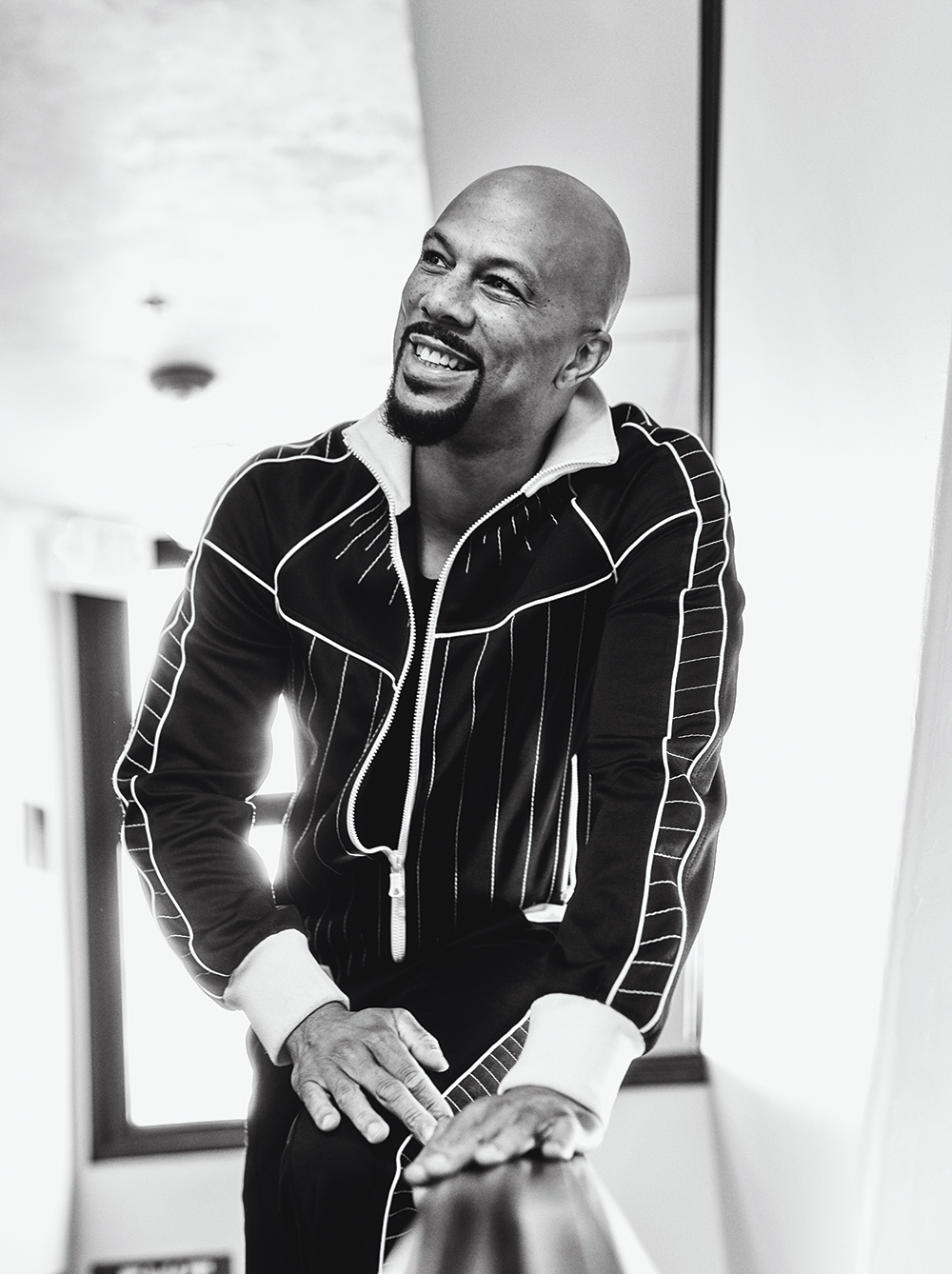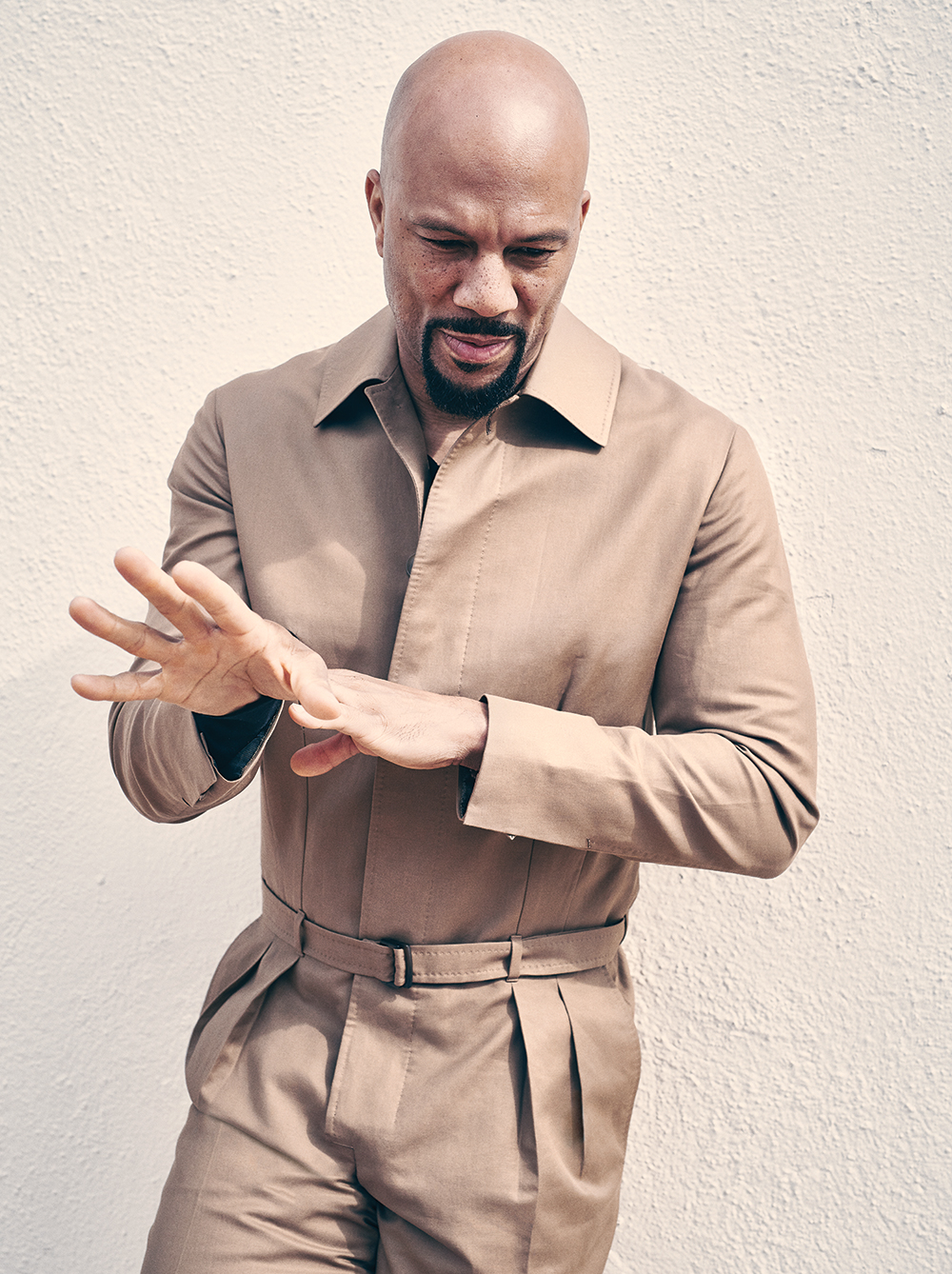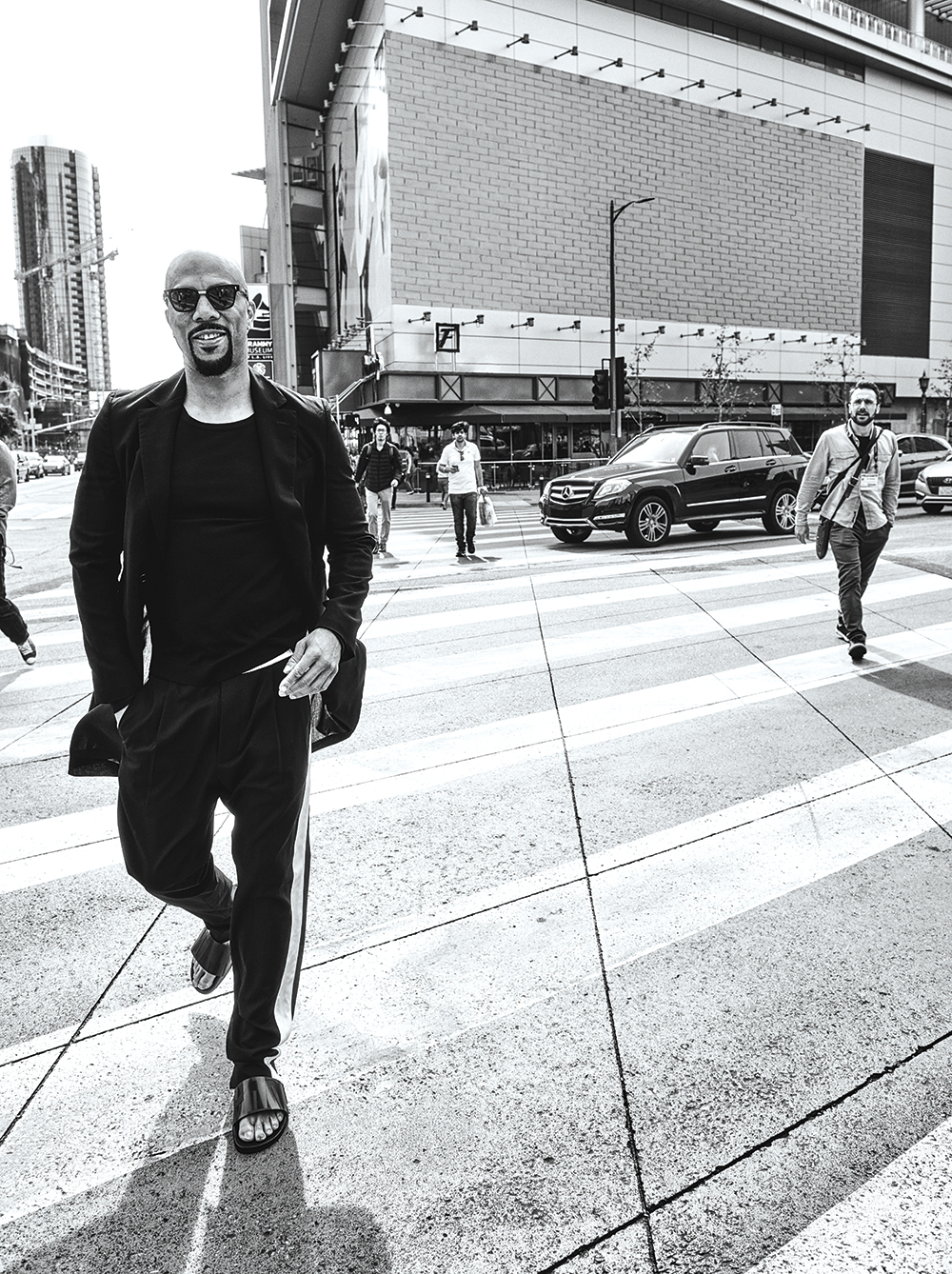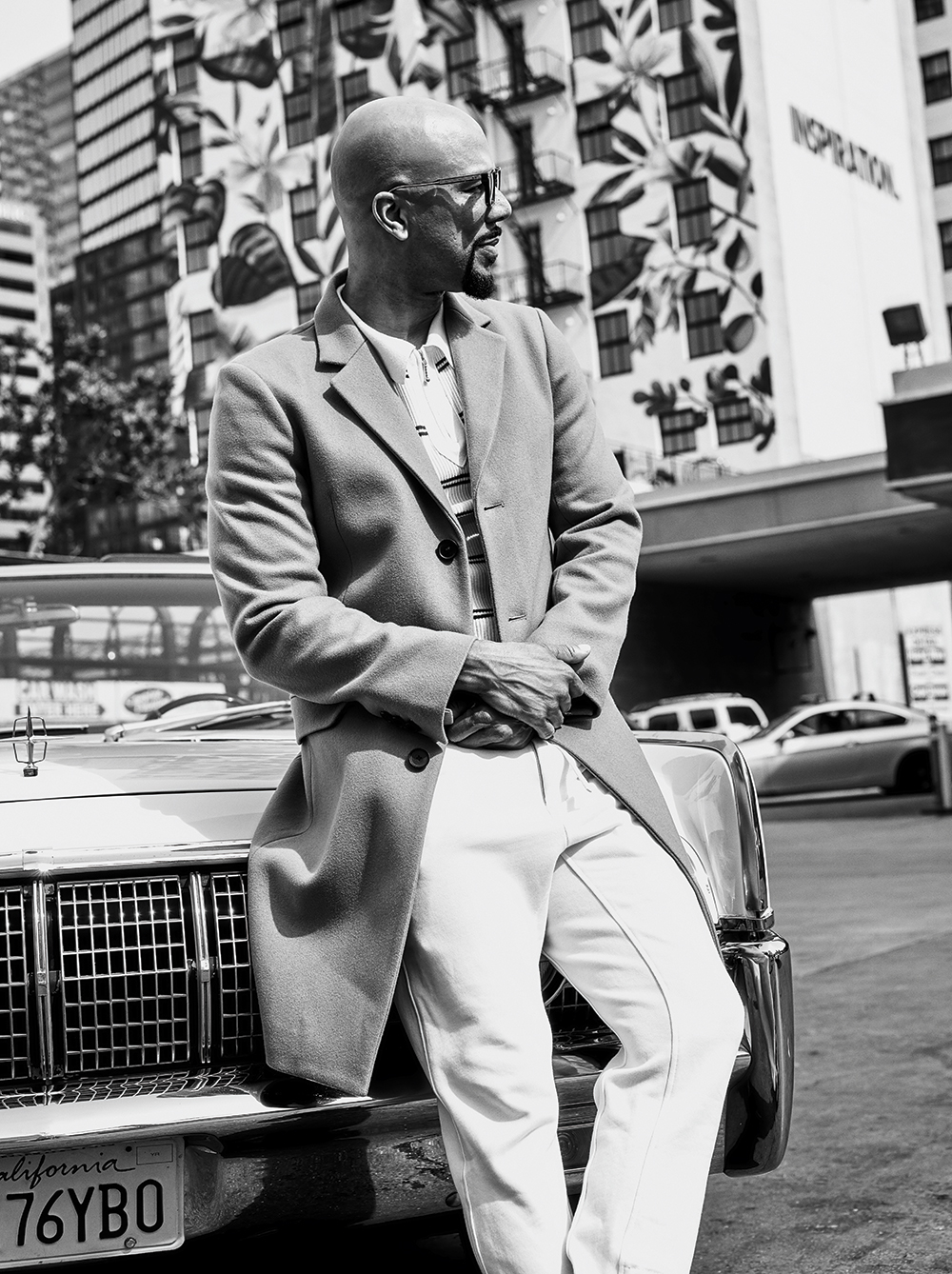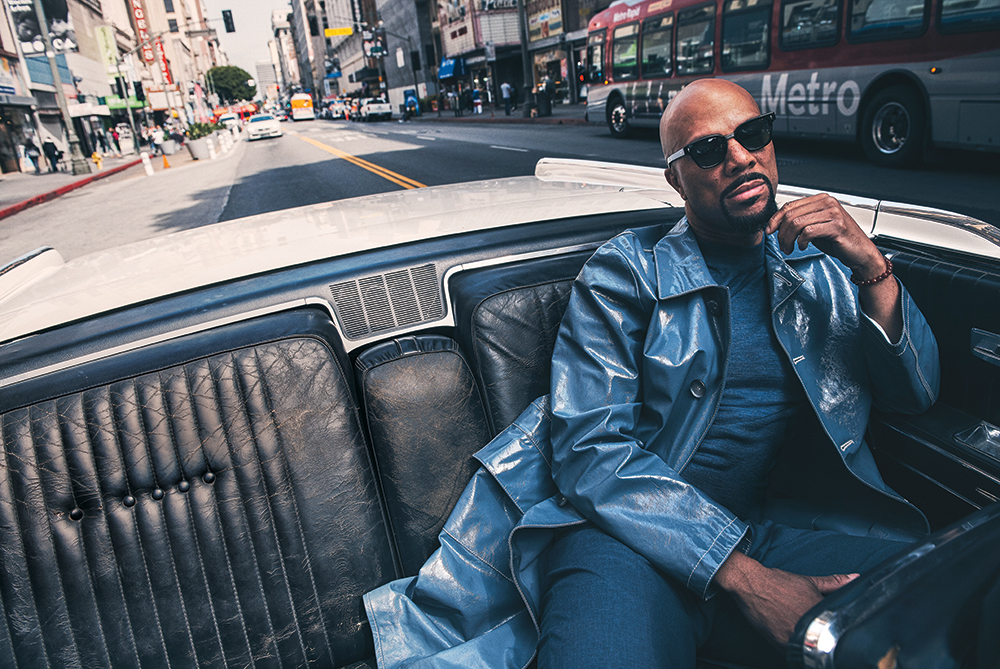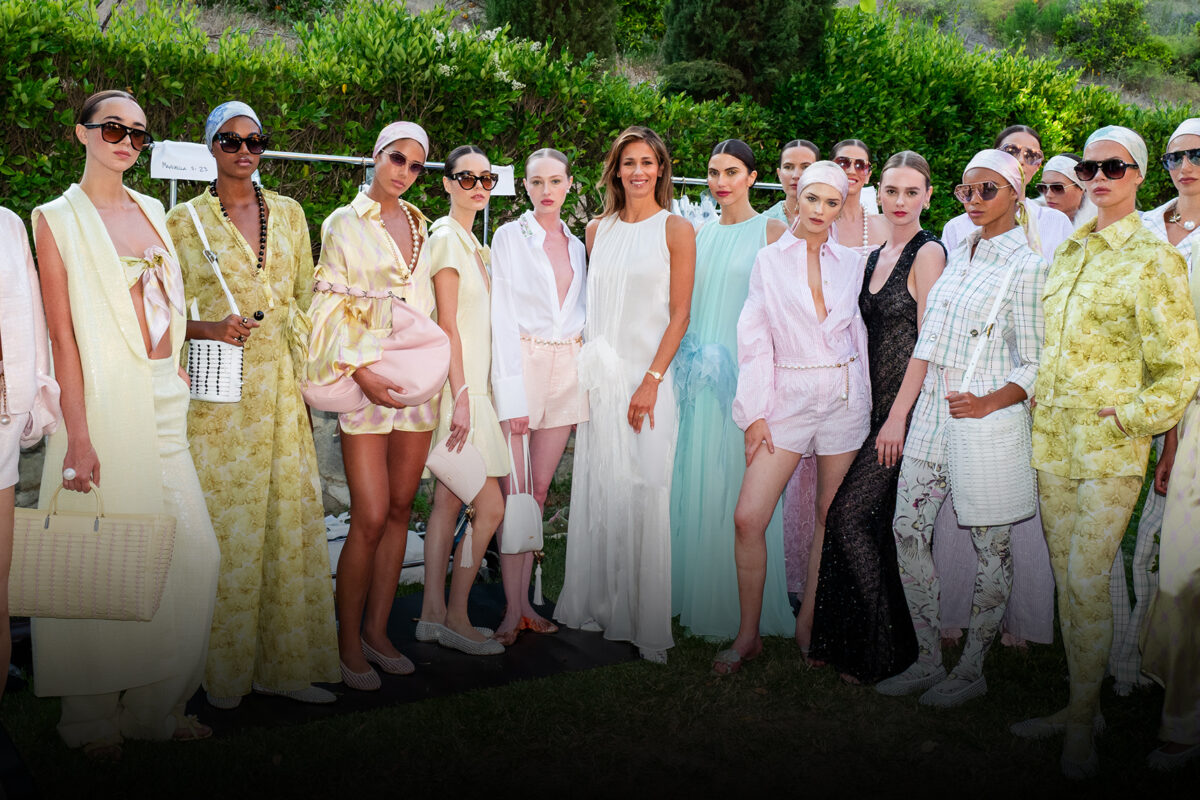The rapper, producer, actor, activist is California’s foremost creative with a conscience
Words by STEPHANIE RAFANELLI
Photography by BEAU GREALY
Styling by ALISON EDMOND
Common has a talent for shooting directly to the heart of a matter. Striding toward my booth at the Viceroy L’Ermitage near his home in Beverly Hills, in a cozy gray T-shirt and jeans, he goes straight in for a bear hug that almost knocks me off my feet. He’s late and seems genuinely pained about it. “I don’t want you to think I’m that kind of guy,” he mumbles, rubbing his post-Oscars stubble. Once he has recovered, first things first: He wants a full rundown of my star sign. (Turns out we’re both moon in Pisces.) I didn’t have him pegged as a keen astrologer, I tell him. He laughs. “Well, I’m not the stereotypical kind of guy.”
Indeed, Common has a knack for finding common ground in the name of common humanity. He was nominated for the Academy Award for Best Original Song with singer Andra Day and fellow songwriter Diane Warren for Marshall’s “Stand Up for Something,” ultimately losing to “Remember Me” from Coco. But his opening duet with Day alongside 10 activists—from Black Lives Matter’s Patrisse Cullors to #MeToo pioneer Tarana Burke—defiantly set the tone for a new era of inclusive Oscars. “If you can change people’s minds, that’s the win,” he says.
He’s not one to waste his words. During the performance, Common poetically name-checked every issue that has divided this country as of late: feminism, immigration, gun control. “It’s such a crucial time in America,” he tells me, his bass-baritone so grounded and rich it verges on hypnotic.
In person, Common is unlike the commanding lyricist we saw on stage. He has a gentle, benevolent presence while sipping his green tea. And when he smiles, his taut facial contours turn from sternness to dimples. “When you first start rhyming, you’re like, ‘I’m the dopest, I’m this, I’m that.’ But when you grow you learn how rap has an ability to activate people,” he says. “Rap is one of the most direct and connective forms of communication that ever existed.”
A musician, activist, actor, producer and children’s book author who was once invited to recite poetry at the White House, Common—formerly known as Common Sense—is anything but ordinary. With three Grammys, an Oscar and a Primetime Emmy on his shelf, he is only a Tony short of an EGOT (Emmy, Grammy, Oscar, Tony), the coveted title held by Quincy Jones, Harry Belafonte and Barbra Streisand. (The missing “T” might not be far off: “I’m looking to write a one-man play.”)
The Chicago-born polymath, who has delivered 11 critically acclaimed albums in the span of 26 years, has dedicated his life to challenging preconceptions. Born Lonnie Rashid Lynn on Chicago’s South Side, Common may have taken a different turn, had it not been for his mother, educator Dr. Mahalia Ann Hines. “My mother changed my life by just saying, ‘Man, you gotta read, you gotta write. I need you to take out the trash…’ It gave me a place where I felt a loved human being. I didn’t have to walk [the streets] in fear.”
His parents split up when he was 1. Five years later, his father, the late Lonnie “Pops” Lynn Sr., a former ABA player, moved to Denver. Although they stayed close, he says: “All of the guys I looked up to were either my age or a little bit older, so they didn’t have their manhood yet. They knew how to hold things down on the streets and how to run things on the streets, but they hadn’t matured. They hadn’t been taught: This is how you handle things with a woman. This is how you handle yourself as a gentleman, as a man.”
Common maintained a relationship with his father from a distance, and had a stepfather to whom he was not close. “So I felt that, from a male perspective, I was raised by some of my older friends and some of the dudes in the ’hood, and that used to be part of street organizations, gangs and stuff. I was raised watching what they did, listening to them. You’re definitely looking for someone you can identify with.”
“I think storytelling is one of the greatest tools we have to break down the barriers of racism”
Now a youthful 46, he’s considered among contemporary rap’s most respected father figures. He has at various times spoken out against glamorized gangsterism, misogyny and homophobia in the genre, and runs the Common Ground Foundation and the Imagine Justice movement. Both work to better the prison system, and the latter was set up in response to Ava DuVernay’s Oscar-nominated documentary 13th, about mass incarceration in America. (Common’s song for the soundtrack, “Letter to the Free,” won an Emmy in 2017.) In 2014, he also played his hero Martin Luther King Jr.’s fellow civil rights activist James Bevel in Selma, winning an Oscar with John Legend in 2015 for the theme song, “Glory.” The film won little else. That same year, #OscarsSoWhite was born.
This year, Common felt things were different at the awards show. “I’ve seen a strong and conscious effort internally [at the Academy] to change the culture of the Oscars,” he says. “This is real change. It was caused by people speaking up. #OscarsSoWhite really affected things. But we’re not there yet. Not while you’re still hearing, ‘This is the first black woman to be nominated for…’”
His own on-stage performance also received acknowledgment. “We were sitting behind Frances McDormand. Afterward, she turned around and said, ‘Oh, man, that was so powerful.’ And my mother was like, ‘Yo, that moved my soul!’” That night, he celebrated with Hollywood’s most relevant power players—Jordan Peele, Dave Chappelle, Tiffany Haddish and Lupita Nyong’o—at Beyoncé and Jay-Z’s Chateau Marmont after-party.
“Stand Up for Something” was played during the Florida town hall for survivors and activists in the wake of the Marjory Stoneman Douglas High School massacre in Parkland, Fla., in February—a fact that makes Common emotional. “My heroes are Muhammad Ali, Dr. King, Dr. Maya Angelou, [poet and activist] Dr. Nikki Giovanni, James Baldwin. And musically, it’s Curtis Mayfield, Marvin Gaye, Bob Marley, KRS-One and Public Enemy, up to Kendrick [Lamar] now. They all provided music that became soundtracks to a movement. And for me to be included in that, to have songs that mean something to people, I’ve got to say, man, it’s an honor.”
“I felt that 2017 was really tough on a lot of people. Coming in to 2018, I felt we needed a manifesto of optimism”
In March, he released August Greene, the eponymous album of his new jazz-rap supergroup with Robert Glasper (“The Herbie Hancock of the new generation,” Common says) and jazz drummer and hip-hop producer Karriem Riggins—an extension of their collaboration on his 2016 album Black America Again, including his track “Letter to the Free.” Releases include “Optimistic,” a cover of Sounds of Blackness’ 1991 song, the video for which features real-life activists, past and present, to show the possibility for change over time. “I felt that 2017 was really tough on a lot of people. Coming in to 2018, I felt we needed a manifesto of optimism.”
More impetus for changing minds comes from his film company, Freedom Road Productions, and its recent projects, such as the South Side Chicago-based, coming-of-age drama series The Chi (pronounced “Shy”), created by Master of None’s Lena Waithe, with Common serving as executive producer, and playing a recurring guest-star role. The show debuted on Showtime in January, and was renewed for a second season while still on the air.
“Our vision for it was to give a new audience an entry into black life in Chicago, with rounded characters, and tell it in a universal, human way. It’s not just what you hear about: the statistics. ‘Oh those black dudes in Chicago, they’re just gangsters.’ I think storytelling is one of the greatest tools we have to break down the barriers of racism.”
It was during high school that Common formed the rap trio C.D.R.; in 1992, while studying business administration at Florida A&M University, he was signed as the outspoken Common Sense, and debuted his first album, Can I Borrow a Dollar?, later that year.
Producer J Dilla, Common’s collaborator who died of a blood disorder in 2006, also inspired Chicago-raised Kanye West, who went on to co-produce Common’s Grammy-nominated album Be in 2005 with J Dilla. He and West still play basketball together regularly. “I’ve known him since he was 19—he was always speaking out. Some of my friends wanted to fight him. I always admired him,” he says. “There’s courage—honesty there, instead of being politically correct.”
Common roomed with J Dilla when he first moved to L.A. in 2004 to be close to auditions after he segued into acting. “JD was sick. I said, ‘Come on out here!’” he recalls. “I think he stayed alive longer because of the sunshine and good doctors.” In 2006, Common made his film debut as a mobster in the dark action comedy Smokin’ Aces; more recently he had roles in Suicide Squad (2016), John Wick: Chapter 2 (2017) and Girls Trip (2017). He is also starring in May’s The Tale, playing the role of supportive boyfriend to Laura Dern’s documentary filmmaker who is forced to reappraise her memories of a childhood relationship with a 40-year-old man. “It’s special. An uncomfortably moving film,” he says of the project, which was based on writer-director Jennifer Fox’s experience with sexual abuse.
He has often publicly shown his support for women and admits to liking the strong kind: His exes include Erykah Badu and Serena Williams; his daughter, Omoye Assata Lynn, was named after the revolutionary African-American civil rights activist Assata Shakur. “Back then, [Badu and Williams] took the heat for just speaking up. Now, it’s more celebrated.” Most recently, he dated attorney-activist Angela Rye. Now single, he says he’d be open to a commitment again. “She doesn’t have to be [activist and scholar] Angela Davis. But I want a woman who treats human beings with compassion, shows love and respect for the waiter and the bellman.”
When he’s not working, expect to find Common at restaurants such as vegan eatery Crossroads and Lucques in West Hollywood. He eats clean but drinks wine: “I’m not a saint, I kick it. It’s all about the balance of life.” His other downtime activity is watching basketball. He was once a ball boy for the Chicago Bulls and often wears his basketball shorts under his jeans to “keep the game close.” Still in great shape from last year’s John Wick: Chapter 2, Common works out in West Hollywood. But there have been some recent changes to his appearance: He no longer wears reading glasses after laser eye surgery. And there’s about to be another. He’s late for Daronn, his barber. “I’ve got to get groomed for an event for Africa tonight,” he says. “I don’t want to show up [looking like] George Jefferson.”
Feature image: BOSS Jacket, $895, sweater, $325 and pants, $275. JACQUES MARIE MAGE sunglasses, $555. Common’s own bracelet, seen throughout.
Grooming by DARRON CARR, TASHA BROWN at Exclusive Artists using Jack Black.
Production by ROCKMAN PRODUCTIONS.
Photographed at Hotel Figueroa, Los Angeles.
This story originally appeared in the Spring 2018 Men’s Edition of C Magazine.

